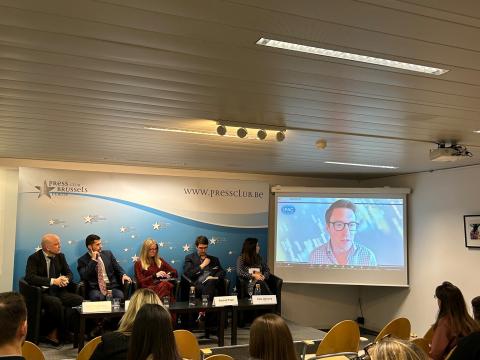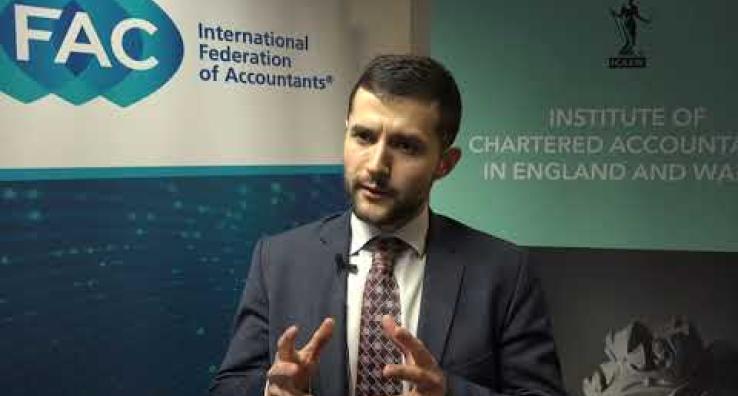IFAC and ICAEW engage leading Anti-Money Laundering Stakeholders on role of the Accountancy Profession
With uncertain economic times and emerging technologies often presenting new opportunities for criminal activities, all actors—public and private—need to work together to counteract money laundering and corruption. Failure to do so can have devastating consequences, funding other serious crimes, including slavery, drug trafficking and corruption.
To shed some light on this crucial issue, IFAC and ICAEW hosted a hybrid event in Brussels during which global and EU experts discussed the importance of changing mindsets and the role of professional skepticism in reducing the risk of economic crime, as well as regulatory changes to improve deterrence and detection of money laundering.
Is Trust Enough to Fight Money Laundering panel discussion
The event included a screening of All Too Familiar, an award-winning short drama produced by ICAEW in collaboration with the UK HM Revenue and Customs. The movie, by making the connection between accountants’ day-to-day work and its impact on society, provided a useful example of good Anti-Money Laundering (AML)/CFT training, focusing on the importance of understanding red flags, and ensuring that staff are trained to spot them.
In particular, the film highlighted how familiarity, and the corresponding trust of a client, can lure professional accountants away from applying robust professional skepticism.
“Is trust enough to fight money laundering?” the event provocatively asked in its title. The answer is obvious. No, trust is not enough to fight money laundering, but what more is needed to improve the way financial intelligence is shared between all players in the anti-money laundering ecosystem?
This was the guiding thread of the panel discussion moderated by Michelle Giddings, Head of AML at ICAEW, and featuring:
- Viktor Ivanov, Policy Officer, anti-money laundering and countering terrorist financing, at DG FISMA (European Commission);
- Kris Meskens, Secretary General of the Belgian Financial Intelligence Processing Unit (CTIF-CFI);
- Inês Oliveira, Policy Analyst at the Financial Action Task Force (FATF) and
- Roland Papp, Senior Policy Officer at Transparency International EU.
Michelle Giddings, opened the discussion: “The world of AML and the fight of economic crime never stands still. Not only are the criminals evolving how they operate but the threats to Europe and the world are evolving too. It is therefore necessary to constantly adapt and improve policy and regulatory frameworks to deal with it."
The discussions highlighted the importance of intelligence sharing and of public-private partnerships – including in areas other than intelligence sharing – as well as the necessity to give the regulated sectors, and particularly DNFPBs (Designated Non-Financial Businesses & Professions), a better understanding of risks and what ‘suspicion’ looks like in front of the firms, as a lot of intelligence and typologies are written for the finance or banking sectors.
Speakers also discussed the global FATF framework and ongoing priorities, as well as the EU AML/CFT package, and the opportunities these initiatives present for a more effective system to fight money laundering and terrorist financing.
With the event in Brussels, the audience was particularly interested in the experts’ views on the consequences of the ruling of the Court of Justice of the EU in WM and Sovim SA v. Luxembourg Business Registers (joined cases C-37/20 and C601/20), striking down the provision requiring disclosure of beneficial owners of companies (see also newly published FATF Guidance to Beneficial Ownership of Legal Persons [Recommendation 24]).
Panelists stressed that implementation of both EU and global standards need to be more effective, and could, for example, be improved through better risk assessments, better mitigation strategies as well as greater awareness of risks, better understanding of the risk-based approach, and increased engagement between supervisors and obliged entities.
Scott Hanson, Director Policy and Global Engagement at IFAC concluded the event, reflecting on the accountancy profession’s role in supporting the public interest and highlighting some of IFAC’s key activities. “The discussion and the movie really highlighted the societal impact of organised crime and money laundering. It is often easy to read news stories in the press and think that they are disconnected from our own experiences. It is also easy to get caught up in the policy decision-making and forget to reflect on what exactly we are trying to prevent. IFAC's Action Plan for Fighting Corruption and Economic Crime is addressing the issue and provides a framework for how we can enhance the accountancy profession’s role in combating corruption and economic crimes, thereby advancing the UN SDGs.”
Image

The topic of anti-money laundering is central priority for IFAC and a central component of the Anti-Corruption Action Plan. Some of the key ongoing initiatives in this space include engaging with IFAC members’ education directors to understand the extent that AML issues are covered in initial and continuing accountancy education, and developing a domestic engagement toolkit for IFAC member bodies to establish themselves as strong partners in the fight against money laundering and corruption.
This activity follows IFAC’s educational series with ICAEW Anti-Money Laundering: The Basics, which helps professional accountants enhance their understanding of how money laundering works, the risks they face, and what they can do to mitigate such risks to make a positive contribution to the public interest.

